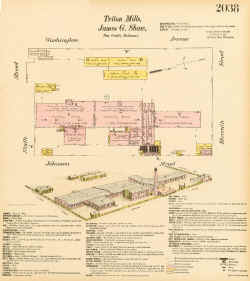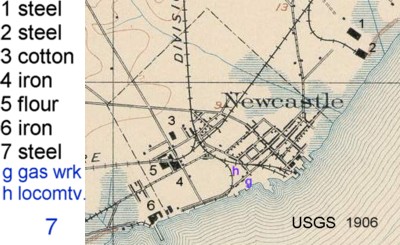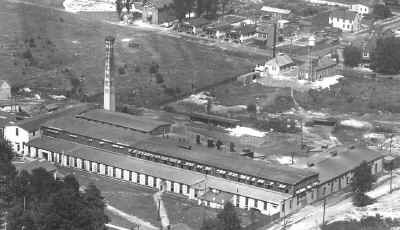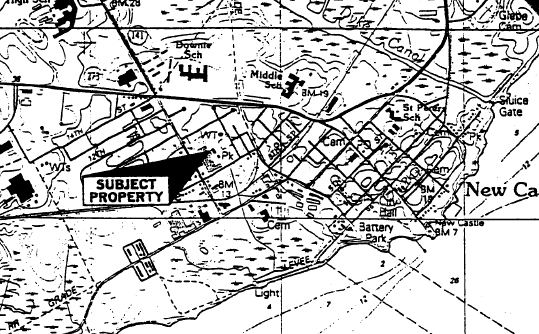
Detail from Hexamer
Fire Insurance survey (1886)
Triton Cotton Mill (and Deemer Steel)
The Triton Cotton Mill (#3 on the
adjacent map) was located just east of Washington Street in an area now
called Shawtown . The first buildings were erected in 1860, 1861 and
additions continued at least until 1886, the date on the third
survey of the site by the Hexamer Co. At that time, the mill
employed "175 hands, half girls".  In1885,
the date of the first Sanborn map, the mill was still running, but by
1901, the mill had closed. It was purchased and reopened as part
of the Deemer Steel Casting Co.. (later New Castle Steel?) In1885,
the date of the first Sanborn map, the mill was still running, but by
1901, the mill had closed. It was purchased and reopened as part
of the Deemer Steel Casting Co.. (later New Castle Steel?)
|
||
| Sources: 1888 Scharf's History of Delaware (D) |
||
| New Castle Manufacturing Co. (B) (S) | ||
|
According to Scharf (1888) THE TRITON SPINNING-MILLS, owned and
operated by James G. Shaw, were erected by him in 1860–61, and sold under
contract to a manufacturing firm in Boston. This firm contracted for the most
improved machines to be made in Biddeford, Maine, to fit out the mills. The
Civil War began, however, before the machinery was completed, and the Boston
firm then gave up its project of engaging in the manufacturing business at New
Castle. James G. Shaw, the proprietor of the Triton Mills, was born in Chester, county of Delaware, Pennsylvania, October 21, 1828. He is a son of the late Samuel Shaw and Mary Ann Eyre, and comes of the old Sharpless stock that came over with William Penn, and settled in Delaware County. After being educated in his native town he engaged in mercantile pursuits. In 1857 he removed to New Castle, where he purchased the Chancellor Johns farm of one hundred and seventy-four acres and laid it out as an addition to the town. This led to the building of his mills, which he has since operated successfully. About 1864 he sold the land he had purchased to Thomas T Tasker, and has since devoted himself to his manufacturing interests. He has been an enterprising citizen and an active promoter and advocate of all public improvements in the town. | |
|
As shown in this undated photo (Courtesy Hagley Museum and Library), the plant at 9th and Washington streets became part of the Deemer Steel Co. It was demolished in 1987. After a study of soil , the top layer of soil was removed before construction of new apartments.
| |



